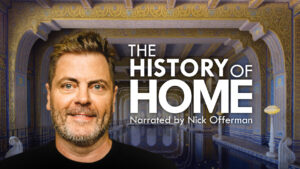
The character Ron Swanson on Parks and Recreation is likable because we understand he is better than the sum of the parts he wants to present to the world.
Actor Nick Offerman uses his Ron Swanson persona a little in the new CuriosityStream series The History of Home, but the show rarely rises to more than a mishmash of topics.
The series is a total of three episodes, about an hour each, filmed in 10 countries and illustrated with brief animations. Interviewed curators, designers, and architects are interesting, to the degree they are allowed to speak, on topics such as royal life at Hampton Court. (Offerman only does voice-over narration and evidently does not travel to locations or talk to experts himself.) The series is a step above some cable-TV infotainment, if only because it does not have the repetitious editing that comes from constant commercial breaks.
“Launched by media visionary John Hendricks, CuriosityStream is the award-winning destination for documentary series and features covering every topic from space exploration to adventure to the secret life of pets,” the company’s website says. Hendricks was the founder and 30-year chairman of Discovery, Inc., which ran the Discovery Channel and Animal Planet shows. As a result, CuriosityStream has “thousands” of nonfiction titles you might expect, some of them original content (Raising Dinos from the Dead; Asteroids: the Source of Life?) and others, such as School, Inc., produced by others such as “Free to Choose,” with host Andrew Coulson of the Cato Institute.
“Whether you want to explore Mars or travel back to ancient civilizations, CuriosityStream adds new binge-worthy films and series each week, empowering you to dive deep into your favorite subjects and explore new territory sure to entertain, enlighten and inspire,” the site says.
But “dive deep” is the problem with most of these sorts of shows, and Offerman deserves better with the capital he built playing Ron Swanson, who after all knew everything there was to know about wood, tools, techniques, and fine furniture. (He provided my title for this piece.)
In Episode Two (“the rooms that sustain, entertain, and define us”), we jump quickly from “halls” in radically different contexts, such as longhouses and Hampton Court; then to the kitchen and gardens of Monticello, in a nod to race; then somehow on to the notion of class, at Highclere Castle (where Downton Abbey was filmed); then to dining rooms, in which Lady Carnarvon hilariously seems to think all of us eat meals in multiple courses, each presented sequentially on a different plate.
(Much of what the series shows involves power and riches, whether Château de Fontainebleau, Japanese luxury toilets, or high-tech printed buildings for use on Mars. A trade mag announced the series by saying it was “slated to examine the history of spectacular homes and the stories behind them.” But this is not how the final cut wants to be seen. The choice of Offerman as host alone would seem to signal down-to-earth.)
But wait: that is not all for Episode Two, not by a long shot! After seven minutes of a deep dive into class issues, we are on to the topic of living rooms, which is really a come-on for parlors and sitting rooms such as the ones shown in Hearst Castle.
Then on to furniture.
Then the topic of boredom (which begins to make sense), by which the show really means board games.
The show is like a paper written for freshman rhet. Offerman, doing his best, sums up that episode gamely: “we just want to enjoy our homes.”
Throughout, he is forced to deliver, gravely, such lines as, “Throughout history, houses have varied drastically in their construction, style, and design.” Elsewhere he says someone is taking “architecture beyond the bounds of human imagination.” How is that?
He says the series hopes to “answer the eternal question: what makes a house a home?” Having not answered the question for three hours, he concludes, “[I]t’s time to ask the big question: what’s home mean to you?”
“Oo, it’s getting philosophical,” one of the series’ talking heads says, and laughs.
